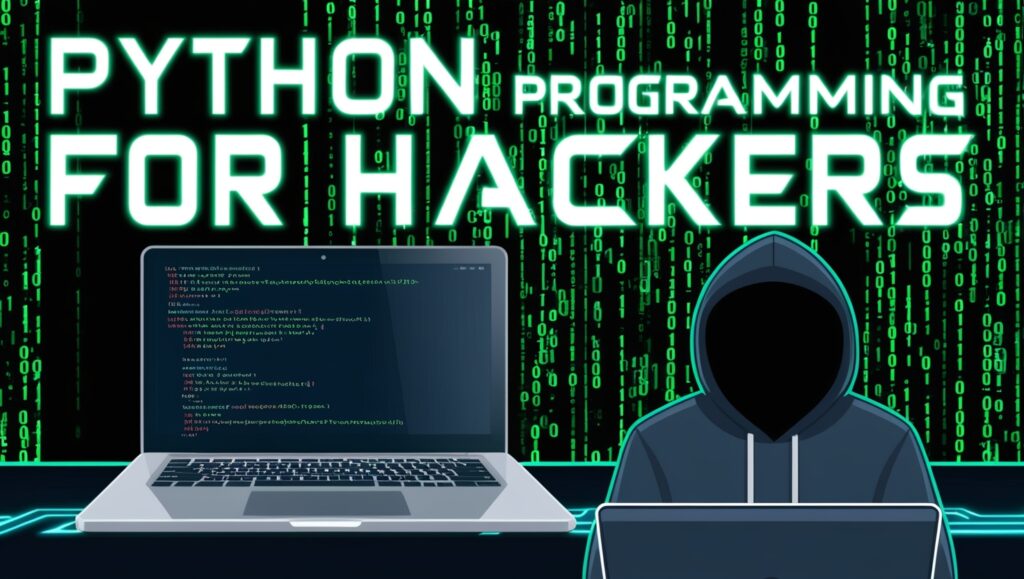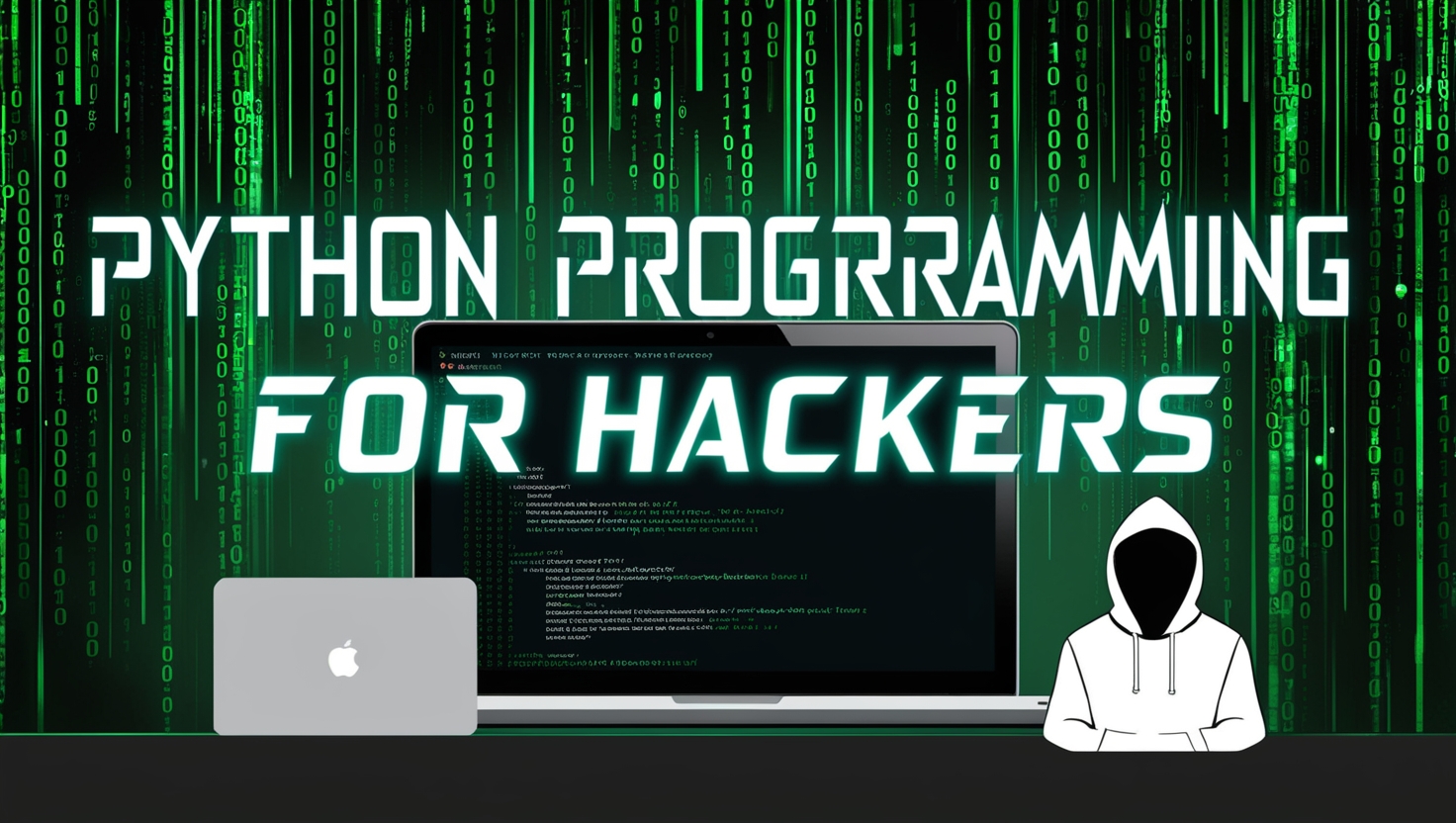Python is a versatile and powerful programming language that has become a favorite among hackers and cybersecurity professionals. Whether you are an aspiring ethical hacker or a seasoned cybersecurity expert, Python programming for hackers opens up a world of opportunities to create powerful tools, automate tasks, and strengthen your cybersecurity defenses. In this blog, we’ll explore the essential aspects of Python programming for hackers, covering everything from setup to advanced techniques.

1. Introduction to Python for Hacking
Python is often considered the go-to language for hackers due to its simplicity, extensive library support, and cross-platform compatibility. Its ability to handle various tasks like web scraping, network scanning, and exploit development makes it invaluable in the world of hacking.
Whether you’re performing penetration tests or automating repetitive tasks, Python programming for hackers enables ethical hackers to efficiently analyze systems, identify vulnerabilities, and build custom tools.
2. Getting Started: Setting Up Python for Hacking
To begin using Python for hacking, follow these steps:
- Install Python: Download and install Python from the official Python website. Ensure you get the latest stable version.
- Choose an IDE: Use Integrated Development Environments like PyCharm, Visual Studio Code, or Jupyter Notebook for better productivity.
- Install Essential Libraries: Install libraries like
requests,scapy, andpwntoolsusingpipto extend Python’s capabilities. - Configure Virtual Environments: Use virtual environments with tools like
venvto manage dependencies and keep projects organized.
By setting up a proper Python environment, you’ll be ready to dive into the exciting world of Python programming for hackers.
3. Python Basics Every Hacker Must Know
Before tackling complex hacking tasks, familiarize yourself with these Python basics:
- Data Structures: Learn how to use lists, dictionaries, and sets to organize and manipulate data effectively.
- Control Flow: Master loops, conditionals, and functions to build dynamic scripts.
- File Handling: Understand how to read, write, and manipulate files—a crucial skill for handling logs and payloads.
- Networking Basics: Learn how to work with sockets and perform basic networking tasks in Python.
These foundational skills will help you leverage Python programming for hackers efficiently.
4. Common Use Cases of Python in Hacking
Python is widely used in hacking for a variety of tasks:
- Web Scraping: Extract data from websites using libraries like
BeautifulSouporScrapy. - Network Scanning: Write scripts to discover open ports and services on a network.
- Automating Tasks: Simplify repetitive tasks like password cracking or log analysis.
- Payload Development: Create custom payloads for penetration testing purposes.
These use cases highlight the versatility of Python programming for hackers.
5. Powerful Python Libraries for Hackers
Enhance your hacking capabilities with these powerful Python libraries:
- Scapy: Ideal for packet crafting and network analysis.
- Requests: A must-have for web scraping and interacting with HTTP.
- Pwntools: Perfect for exploit development and binary exploitation.
- Paramiko: Simplifies working with SSH protocols.
- Socket: Enables low-level networking and communication.
Mastering these libraries is crucial for Python programming for hackers.
6. Python in Action: Building Hacking Tools
Here are some examples of hacking tools you can build using Python:
- Network Scanner: Identify active devices and open ports on a network.
- Keylogger: Record keystrokes for testing system vulnerabilities.
- Brute Force Script: Test the strength of passwords on systems.
- Reverse Shell: Establish a connection back to a target system for command execution.
Building these tools demonstrates the power of Python programming for hackers.
7. Ethical Hacking and Python: A Responsible Approach
Ethical hacking is about using your skills to protect systems, not harm them. While Python programming for hackers provides powerful tools, it’s essential to:
- Follow the Law: Always operate within legal boundaries.
- Get Authorization: Obtain permission before conducting penetration tests.
- Document Findings: Report vulnerabilities to help organizations improve security.
Responsible use of Python programming for hackers ensures a safer digital world.
8. Python Scripting for Cyber Defense
Python is not just for attacking systems; it’s also a valuable tool for cyber defense:
- Intrusion Detection: Automate log analysis to identify suspicious activities.
- Malware Analysis: Deconstruct malicious code to understand its behavior.
- Incident Response: Develop scripts to quickly respond to security breaches.
Using Python for cyber defense reinforces its versatility and importance.
9. Advanced Python for Hackers
Take your skills to the next level with advanced techniques:
- Reverse Engineering: Use Python to analyze and modify binaries.
- Custom Exploits: Develop tailored exploits for specific vulnerabilities.
- Cryptography: Implement encryption and decryption methods for secure communication.
Advanced Python programming for hackers requires in-depth knowledge and creativity.
10. Resources to Master Python for Hacking
Stay ahead of the curve with these resources:
- Books: “Black Hat Python” and “Violent Python” are excellent guides.
- Online Courses: Platforms like Udemy and Coursera offer specialized courses on Python hacking.
- Communities: Join forums like Hack The Box or Reddit’s r/netsec to learn and share knowledge.
Continuous learning is key to excelling in Python programming for hackers.
11. Conclusion
Python programming for hackers is a game-changer in the world of ethical hacking. From automating tasks to creating sophisticated tools, Python empowers hackers to work efficiently and responsibly. By mastering the fundamentals, exploring advanced techniques, and leveraging powerful libraries, you can harness Python’s full potential for ethical hacking and cybersecurity.
12. FAQ Questions
Q1: Is Python suitable for beginners in hacking? A: Absolutely. Python’s simplicity and extensive library support make it ideal for beginners.
Q2: What are the legal considerations for hacking? A: Always operate within the law and obtain proper authorization before conducting penetration tests.
Q3: Can Python replace other programming languages in hacking? A: While Python is versatile, it’s best used alongside other languages like C and JavaScript for a well-rounded skill set.
Python programming for hackers is an exciting journey filled with learning and opportunities. Start today and explore the endless possibilities this language offers.
Check More Blog:-https://thetechcrime.com/best-osint-tools/
Check My YouTube Chenal:- https://www.youtube.com/@Thetechhacker231

Leave a Reply